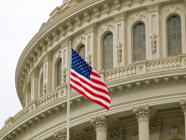Senate energy panel members open to carbon plan

A top Democrat and Republican on energy matters
in the Senate left the door open to compromise on a
potential carbon tax, but a top Republican House
energy leader seemed less receptive during a Nov. 15
seminar in Washington, D.C.
The next chairman of the Senate Energy and Natural
Resources Committee, Ron Wyden, D-Ore., and the
ranking Republican on that panel, Sen. Lisa
Murkowski of Alaska, both embraced compromise and at
least left the door open for a carbon tax.
But Rep. Ed Whitfield, R-Ky, who chairs the
Subcommittee on Energy and Power within the House
Energy & Commerce Committee, was more cautious.
Whitfield said most House GOP lawmakers won’t
embrace a carbon tax “until we have a lot more
details than what we know now,” Whitfield said.
The congressional leaders made their comments during
a CQ/Roll Call seminar sponsored by the Nuclear
Energy Institute (NEI). During the seminar, which
was webcast, Whitfield appeared later than the
senators and was not on hand to hear their comments.
Whitfield, did, however, note he is a former
Washington, D.C., neighbor of Wyden and has
collaborated with him on legislation in the past.
Wyden is set to succeed Sen. Jeff Bingaman, D-N.M.,
as chairman of the Senate Energy and Natural
Resources Committee. The New Mexico Democrat is
retiring.
Whitfield said it makes little sense for
energy-related panels to pass bills that have scant
chance of gaining majority support in the opposite
chamber.
Wyden, Murkowski ‘love-fest’ touted cooperation.
Some subsequent speakers in the two-hour seminar
described the joint appearance by Wyden and
Murkowski as something of a “love-fest” by the two
veteran lawmakers.
“I am going to extend my hand because we are going
to work together,” Murkowski said as she and Wyden
shook hands.
Murkowski indicated that some type of carbon tax
might be a more realistic way to address climate
change than the unwieldy “cap-and-trade” proposals.
The Waxman-Markey “American Clean Energy and
Security Act” featured cap-and-trade as its
centerpiece. It passed the then Democrat-controlled
House in 2009 but never passed the Senate.
Hurricane Sandy and the so-called “fiscal cliff”
have sparked talk that a carbon tax could merit
congressional consideration. But Murkowski noted
that any carbon tax proposal must be considered
mostly for “environmental responsibility” and not
revenue generation.
As for the GOP: “We need to show a level of
environmental responsibility that is in conjunction
to where young people are coming from,” Murkowski
said. At the same time, young people “also need a
decent job,” Murkowski said.
Wyden agreed that any energy policy must strike a
balance. “It’s not really an energy speech” unless
lawmakers “say they say are for ‘all of the above’
at least four times,” Wyden said.
Wyden and Murkowski agreed that thousands of jobs
could be at risk if there is not a short-term
extension of the production tax credit that benefits
wind. Both senators also said that a long-term,
detailed review of energy subsidies is needed in the
future.
For Wyden’s part, he suggested that traditional
fossil fuels seem to currently get the bulk of the
subsidies while more renewable energy sources
receive “the crumbs.”
At the same time, Wyden realizes that
resource-extraction areas of the country don’t want
to turn into “ghost towns.”
Whitfield talks EPA regulation, Yucca Mountain
In the House, Whitfield said his panel’s biggest
accomplishment in the just-concluding Congress has
been putting the brakes on some U.S. Environmental
Protection Agency rules.
“Not that we stopped a lot of them, but we delayed a
lot of them,” Whitfield said. The Kentucky
Republican said federal appeals court rejection of
certain EPA standards proposed for coal plants
indicate the extent of the EPA “over-reach” during
the Obama administration.
Whitfield also said that the Obama administration
erred by turning away from plans for the national
nuclear waste repository at Nevada’s Yucca Mountain.
“I personally believe we would be better off if we
just go ahead and finish Yucca Mountain,” Whitfield
said.
“That was one of the mistakes made by Sen. Harry
Reid and others,” Whitfield said. Reid, D-Nev., is
the Senate majority leader.
Nuclear energy came up again after all the lawmakers
left the stage. Environmental Defense Fund Senior
Director Elgie Holstein said much of the
environmental community still has major concerns
about nuclear power but is no longer “reflexively”
opposed to it.
The EDF official indicated, however, that waste and
financial concerns could keep nuclear from growing
as a low-carbon option.
PSEG Power President and COO William Levis said he
would have liked to see the lawmakers better define
what they mean as “all of the above.” Over the
years, the Public Service Enterprise Group (NYSE:
PEG) subsidiary has seen its coal, gas and nuclear
resources deemed “least cost” options at one time or
another.
So Levis said he is skeptical that anybody can
accurately predict the energy future. But all
panelists were encouraged to see a recent
International Energy Agency report that said the
United States is on the brink of achieving energy
independence.
Exelon (NYSE: EXC) Senior Vice President for
Government Affairs David Brown said the weak economy
has suppressed energy demand for power providers at
the same time there has been a growing degree of
subsidies for certain types of generation.
Wayne Barber is chief analyst for generation at GenerationHub, a unit of Energy Central
Copyright © 1996-2012 by CyberTech, Inc. All rights reserved.
To subscribe or visit go to: http://www.energycentral.com
To subscribe or visit go to: http://www.energybiz.com